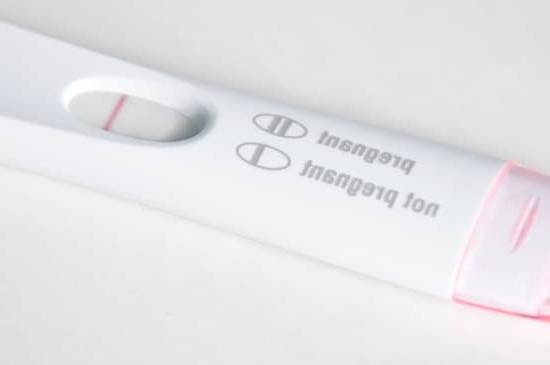How soon will a pregnancy test read positive? This is a common question among women who suspect that they may be pregnant. Understanding how pregnancy tests work and the importance of timing can provide valuable insight into when to take a test and how soon to expect accurate results.
Pregnancy tests work by detecting the presence of the hormone human chorionic gonadotropin (hCG) in urine or blood. This hormone is produced by the placenta shortly after a fertilized egg attaches to the uterine lining. The amount of hCG in the body typically doubles every 48 to 72 hours during early pregnancy, making it an effective marker for confirming pregnancy.
Timing is crucial when it comes to taking a pregnancy test. Testing too early can result in a false negative, as hCG levels may not be high enough to be detected. It is recommended to wait at least one week after a missed period before taking a home pregnancy test for accurate results. If testing earlier than this, consider using an early detection test that can detect lower levels of hCG.
Other factors can affect pregnancy test results, such as medication, fertility treatments, and certain medical conditions. It’s important to follow the instructions provided with the test and consult with a healthcare professional if there are any concerns about the accuracy of the results. By understanding these key points, women can better gauge how soon a pregnancy test will read positive and make informed decisions about when to take a test for reliable results.
How Pregnancy Tests Work
Understanding Pregnancy Tests
Pregnancy tests work by detecting the presence of a hormone called human chorionic gonadotropin (hCG) in a woman’s urine or blood. This hormone is produced by the cells of the developing placenta shortly after implantation of the fertilized egg in the uterus. Home pregnancy tests, which are commonly used, detect hCG in urine samples and provide results within minutes.
How Pregnancy Tests Work
Most home pregnancy tests involve dipping a test stick into a urine sample, or placing drops of urine onto a test strip, and then waiting for the result. Some tests may require holding the test stick directly in the urine stream. As for blood pregnancy tests, they are performed at a doctor’s office and measure the hCG levels in the blood.
The Importance of Timing
The accuracy of a pregnancy test result depends on timing. Taking a pregnancy test too early may result in a false negative, as there may not be enough hCG present to be detected. It is generally recommended to wait until at least one day after a missed period to take a home pregnancy test for more accurate results.
However, some early detection tests claim to be able to detect hCG levels before your missed period. Consulting with your healthcare provider can also help determine when would be best to take the test based on individual factors such as menstrual cycle length and symptoms experienced.
The Importance of Timing
Timing is crucial when it comes to taking a pregnancy test. Understanding the importance of timing can help individuals achieve accurate and reliable results. In this section, we will discuss how soon a pregnancy test will read positive and the factors that can affect the timing of the test.
Menstrual Cycle and Timing
The menstrual cycle plays a significant role in determining when a pregnancy test will read positive. Typically, a woman’s menstrual cycle is around 28 days, with ovulation occurring approximately 14 days before the start of her next period. If conception occurs during ovulation, it may take about six to twelve days for the fertilized egg to implant in the uterus and start producing hCG – the hormone detected by pregnancy tests.
Early Testing
Some women may be eager to find out if they are pregnant as soon as possible. However, testing too early can yield false negative results. It is recommended to wait until at least one day after the missed period before taking a pregnancy test. Testing too early can result in a negative reading when, in fact, a woman may be pregnant.
Factors Affecting Detection Time
Several factors can affect how soon a pregnancy test will read positive. These include individual differences in hCG production, the sensitivity of the pregnancy test used, and potential ovulation irregularities or variations in the length of menstrual cycles. Additionally, certain medications or medical conditions can impact hormone levels and affect the accuracy of pregnancy tests. Consider consulting with a healthcare provider for personalized guidance on timing and testing based on your unique circumstances.
Early Signs of Pregnancy
When a woman becomes pregnant, there are several early signs and symptoms that can indicate a pregnancy even before taking a pregnancy test. One of the most common signs is a missed period, although this can also be due to other factors such as stress or hormonal imbalances. Other early signs of pregnancy may include nausea, breast tenderness, fatigue, and frequent urination.
Additionally, some women may experience implantation bleeding, which occurs when the fertilized egg attaches to the wall of the uterus. This light spotting usually happens around 10 to 14 days after conception and is often mistaken for a light period. However, it is important to note that not all women will experience these early signs of pregnancy.
Some women may also notice changes in their sense of smell or taste, as well as food aversions or cravings. These early symptoms may vary from woman to woman and can also be influenced by other factors such as age and overall health. It’s important to consult with a healthcare professional if you suspect you might be pregnant.
According to experts, most at-home pregnancy tests claim to provide accurate results as early as the first day of a missed period. However, it is generally recommended to wait at least one week after a missed period for more accurate results. This is because hCG levels (the hormone detected by pregnancy tests) double every 48-72 hours during early pregnancy. Waiting longer before testing can increase the likelihood of getting an accurate reading.
Fertility Tracking and Ovulation
When trying to conceive, understanding your fertility cycle and pinpointing the time of ovulation is crucial. Knowing when you ovulate can greatly increase your chances of getting pregnant, as this is the prime time for conception to occur.
There are several methods for tracking ovulation, including monitoring basal body temperature, cervical mucus changes, and using ovulation predictor kits. Additionally, some women may use fertility apps or calendars to help track their menstrual cycle and predict when they may be ovulating.
Methods for Tracking Ovulation Include
- Basal body temperature monitoring
- Monitoring cervical mucus changes
- Ovulation predictor kits
- Fertility apps or calendars
Understanding these methods can help women identify the most fertile days in their cycle, increasing the likelihood of successful conception.
It’s important to note that sperm can survive in the female reproductive tract for up to five days, so having intercourse in the days leading up to ovulation can also result in pregnancy. Therefore, being aware of when you are most likely to ovulate can greatly impact your decision on when to take a pregnancy test.
In summary, knowing how soon will a pregnancy test read positive depends largely on understanding your own fertility cycle and pinpointing the time of ovulation. It is recommended to wait at least until after a missed period before taking a pregnancy test for more accurate results.
When to Take a Pregnancy Test
Many women wonder how soon a pregnancy test will read positive after conception. The answer depends on several factors, including the sensitivity of the test, the timing of ovulation, and implantation. In general, most at-home pregnancy tests are designed to detect the pregnancy hormone hCG (human chorionic gonadotropin) when it reaches a certain level in the urine. This usually occurs around 6-12 days after ovulation.
It’s important to note that not all pregnancy tests are created equal. Some tests are more sensitive than others, allowing them to detect lower levels of hCG earlier on. For example, some early result pregnancy tests can potentially provide accurate results as soon as 6-8 days after ovulation, while others may require waiting until the first day of a missed period.
The timing of ovulation and implantation also play a crucial role in how soon a pregnancy test will read positive. If a woman ovulates later than usual, or if there is a delay in implantation, it can take longer for hCG levels to rise to a detectable level by the testing kit.
Therefore, for the most accurate results, it’s important to understand one’s menstrual cycle and track ovulation using methods such as basal body temperature charting or ovulation predictor kits.
| Factors Affecting Pregnancy Test Results | How Soon Will Test Read Positive |
|---|---|
| Sensitivity of the test | Around 6-12 days after ovulation |
| Timing of ovulation and implantation | Dependent on individual cycle and timing of events |
Factors That Affect Pregnancy Test Results
When it comes to taking a pregnancy test, there are several factors that can affect the results. It’s important to understand these factors in order to get an accurate reading on your test. Here are some things to consider when taking a pregnancy test:
- Medications: Certain medications, such as fertility drugs, antihistamines, and even certain types of hormonal birth control, can affect the results of a pregnancy test.
- Timing: The timing of when you take the test can greatly impact the results. Taking the test too early or too late can lead to false negatives or positives.
- Expired Tests: Using an expired pregnancy test can also lead to inaccurate results. It’s important to always check the expiration date before taking a test.
In addition to these factors, it’s important to note that not all pregnancy tests are created equal. Some tests may be more sensitive than others, which can impact how soon they will read positive. Understanding these factors can help you make informed decisions when it comes to taking a pregnancy test.
Finally, it’s also crucial to consider your own individual health and body when taking a pregnancy test. Every person’s body is different, so what may work for one person may not work for another. It’s important to consult with a healthcare professional if you have any concerns about taking a pregnancy test.
Overall, understanding the various factors that can affect pregnancy test results is essential in obtaining accurate readings on your tests. By being aware of these factors and making informed decisions, you can ensure that you get the most reliable results possible when taking a pregnancy test.
How Soon Will a Pregnancy Test Read Positive
When it comes to taking a pregnancy test, one of the most pressing questions on many women’s minds is: how soon will a pregnancy test read positive? The answer varies depending on several factors, including the type of test being used and the timing of ovulation and implantation. Understanding these factors can help individuals to determine the best time to take a pregnancy test for the most accurate results.
In general, most at-home pregnancy tests are designed to detect the presence of human chorionic gonadotropin (hCG) in urine. This hormone is produced by the placenta shortly after a fertilized egg attaches to the uterine lining. The concentration of hCG increases rapidly in early pregnancy, which allows for detection on a home pregnancy test.
For many women, an at-home pregnancy test can accurately detect hCG levels as early as one week after conception. However, it’s important to note that this timeframe may vary depending on individual factors such as the length of one’s menstrual cycle or variations in hCG production. In some cases, it may be more accurate to wait until at least 14 days after ovulation to ensure an accurate result.
Additionally, some advanced at-home pregnancy tests boast early detection capabilities that can determine pregnancy up to 6 days before a missed period. These tests are typically more sensitive and can detect lower levels of hCG in urine. However, it’s essential to remember that even with these advanced tests, there is still a risk of receiving a false negative if taken too early in the pregnancy process.
Tips for Accurate Testing and Interpretation
In conclusion, understanding the timing and accuracy of pregnancy tests is crucial for anyone trying to conceive or determine if they are pregnant. As discussed in this article, the early signs of pregnancy can vary from person to person, making it important to pay attention to potential symptoms and track fertility and ovulation to maximize the chances of accurate results.
The timing of when to take a pregnancy test is also essential, as taking the test too early can lead to a false negative result.
One of the most common questions people have is “how soon will a pregnancy test read positive?” The answer varies, as some tests can detect pregnancy hormones as early as 7-10 days after conception, while others may require waiting until after a missed period for accurate results. Factors that affect pregnancy test results such as medication, medical conditions, and improper testing techniques should also be taken into consideration to ensure accurate interpretation.
To obtain the most accurate results from a pregnancy test, it’s important to follow instructions carefully and consider factors that may affect the reliability of the test. It’s also recommended to consult with a healthcare professional if there are any concerns about fertility or potential pregnancy. By being informed about how pregnancy tests work and considering the importance of timing and accuracy, individuals can make informed decisions about their reproductive health.
Frequently Asked Questions
What Is the Earliest a Pregnancy Test Will Show Positive?
A pregnancy test can show a positive result as early as 8-10 days after conception. However, for accurate results, it is recommended to wait until the first day of a missed period or later.
How Long Does It Take for hCG to Show Up in Urine?
It can take around 7-12 days after conception for hCG (human chorionic gonadotropin) to show up in urine. This hormone is produced by the placenta shortly after conception and is what pregnancy tests detect to indicate pregnancy.
How Quickly Does Positive Line Show on Pregnancy Test?
The time it takes for a positive line to show on a pregnancy test can vary depending on the sensitivity of the test and the concentration of hCG in the urine. In general, it can take anywhere from a few minutes to 10 minutes for the positive line to appear after taking the test.

Welcome to my fertility blog. This is a space where I will be sharing my experiences as I navigate through the world of fertility treatments, as well as provide information and resources about fertility and pregnancy.





